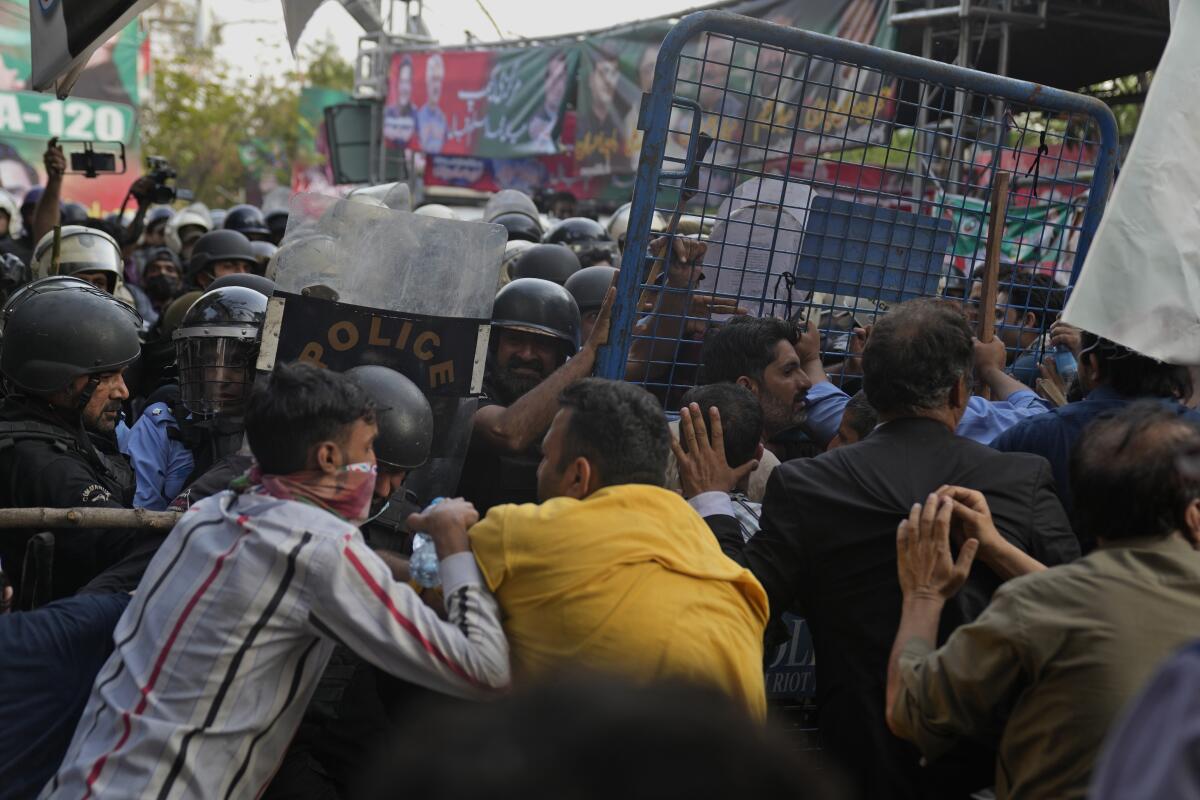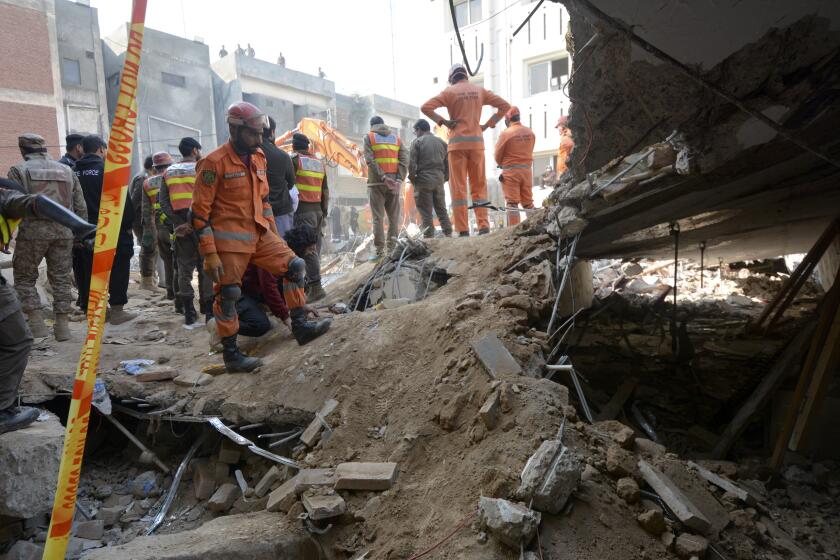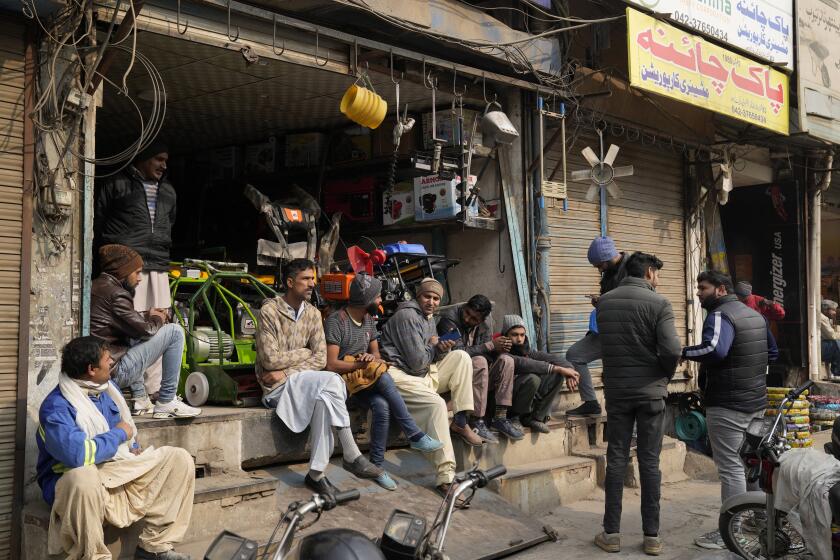Clashes erupt in Pakistan after police try to arrest former Prime Minister Imran Khan

- Share via
LAHORE, Pakistan — After clashing with supporters of former Pakistani Prime Minister Imran Khan outside his home for a second day Wednesday, police paused their efforts to arrest the ousted premier over his failure to appear in court last week on graft charges.
Police had besieged the 70-year-old opposition leader’s house in the eastern city of Lahore since Tuesday as his supporters hurled rocks and bricks and swung batons snatched from officers. Police fired tear gas, and clashes went on into the afternoon Wednesday before subsiding.
Violence was also reported between Khan’s supporters and police in other major cities, including Karachi, Islamabad, the garrison city of Rawalpindi, Peshawar, Quetta and elsewhere in Pakistan. The government sent additional police to the upscale Lahore neighborhood of Zaman Park, where Khan lives.
Early Wednesday, Khan emerged from his house to meet with his supporters, who had faced tear gas and police batons through the night to save him from arrest. He said that he was ready to travel to Islamabad, the Pakistani capital, this weekend under his arrest warrant but that police did not accept the offer.
Khan later posed for cameras seated at a long table, showing off piles of spent tear gas shells that he said had been collected from around his home.
“What crime did I commit that my house has been attacked like this,” he tweeted. Fawad Chaudhry, a senior party leader from Khan’s party, claimed that hundreds of Khan’s supporters had been injured.
The suicide attack that killed 100 people in a Sunni mosque in Peshawar was one of the deadliest targeting Pakistani security forces in recent years.
At the Islamabad High Court, a lawyer for Khan, Khawaja Haris, petitioned for the suspension of the warrants against the former premier, but the court denied the motion.
Khan, who was ousted in a no-confidence vote in parliament last April, was ordered to appear before a judge in Islamabad on Friday to answer charges of illegally selling state gifts he had received during his term as premier and concealing his assets.
Khan has avoided appearances before the court since November, when he was wounded in a gun attack at a protest rally in eastern Punjab province, claiming he was not medically fit to travel from Lahore to Islamabad to face indictment.
Last week, he went to Islamabad to appear before three courts, but he failed to appear before the fourth court to face indictment in the graft case, which is a legal proceeding for starting his trial.
The power went out in much of Pakistan after an overnight energy-saving measure by the government led to a failure to reboot the grid after daybreak.
Khan has claimed that the cases against him, which include terrorism charges, are a plot by the government of his successor, Prime Minister Shahbaz Sharif, to discredit him.
The situation at Khan’s home in Lahore calmed early Wednesday afternoon, and police stepped back, apparently to ease tensions. This encouraged more Khan supporters to join those outside and inside his home. Khan, still wearing a gas mask, greeted them.
Azhar Siddique, another of Khan’s lawyers, said the Lahore High Court ordered police to halt the operation outside Khan’s home until Thursday, though they will remain deployed nearby.
The Punjab provincial government said Wednesday that more than 100 police officers were injured in clashes with Khan’s supporters. They denied Khan’s allegation that officers were using live ammunition.
Breaking News
Get breaking news, investigations, analysis and more signature journalism from the Los Angeles Times in your inbox.
You may occasionally receive promotional content from the Los Angeles Times.
From his home, Khan urged his followers Tuesday to fight on even if he is arrested. “They think this nation will fall asleep when Imran Khan is jailed,” he wrote on Twitter. “You need to prove them wrong.”
On Wednesday, he tweeted that there was a plot “to abduct & assassinate” him.
Sharif criticized Khan in televised remarks, saying that the former premier “considers himself above the law, and he has been defying court orders to avoid arrest.” Sharif insisted that he had nothing to do with the arrest warrant, which he said was a court order that the police were carrying out.
In Pakistan’s turbulent political history, at least seven former prime ministers have been arrested in various cases and tried by courts since the country was created in 1947 after gaining independence from British colonial rule.
The Asian Development Bank will provide $2.5 billion in aid to Pakistan, where deluges of rain have killed about 1,700 people since mid-June.
Former Prime Minister Zulfikar Ali Bhutto was hanged by the military government in 1979 after his ouster in a coup. His daughter, Benazir Bhutto, served twice as prime minister and was assassinated during an election rally in 2007 in the garrison city of Rawalpindi.
Nawaz Sharif, Pakistan’s longest-serving premier and the brother of the current prime minister, was in office from 1990 to 1993 and from 1997 to 1999, when he was ousted in a military coup led by Gen. Pervez Musharraf. He returned as premier in 2013 but was ousted by the country’s Supreme Court in 2017.
Sharif was later arrested, tried and convicted in a corruption case, although he has always denied the charges and today lives in exile in Britain.
More to Read
Sign up for Essential California
The most important California stories and recommendations in your inbox every morning.
You may occasionally receive promotional content from the Los Angeles Times.













